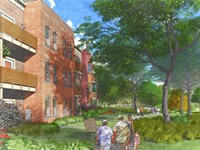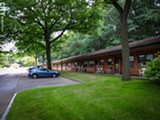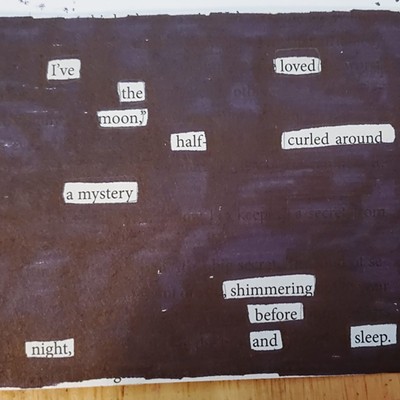[
{
"name": "500x250 Ad",
"insertPoint": "5",
"component": "15667920",
"parentWrapperClass": "",
"requiredCountToDisplay": "1"
}
]
It's not unusual for development proposals to be controversial, and several development plans are generating a lot of heat in Rochester right now. But one of the most complex is the expansion plan for Cobbs Hill Village, a 60-year-old apartment complex for low-income senior residents.
Currently, the Village consists of six one-story apartment buildings tucked into the north side of Cobbs Hill Park, with the woods of Cobbs Hill itself rising up behind it.
It's an attractive, unique site for apartments, carved out of the park by city officials in 1956 specifically for housing for low-income Rochesterians over the age of 55. Rents run from $326 for a studio to $505 for a one-bedroom apartment.
The apartments are owned and operated by Rochester Management, a non-profit organization that operates residential units throughout the Rochester area for low and middle-income residents. Rochester Management says the 60 current units are outdated, and it wants to replace them with two- and three-story buildings that would contain 98 units.
The majority of the units would be classified "below-market-rate affordable" units – something the region needs more of – and Rochester Management says current residents would be guaranteed units at the rent they're now paying. Some of the new units, however, would be market rate.
The new units would have larger kitchens, better appliances, more accessible laundry facilities, and better heating and air-conditioning, Rochester Management says. There would be a fitness room, a computer lab, an indoor community space, and private outdoor space, none of which the current units have. And Rochester Management argues that because the current units open directly onto common sidewalks, residents lack privacy.
The plan has met with exceptionally strong opposition, however, from neighborhood organizations, environmentalists, and the Cobbs Hill Village tenants' association.
Among their arguments: that the current units are perfectly serviceable and can be upgraded, that the rents in many of the new units won't be affordable to many low-income older people, and that two- and three-story buildings are incompatible with the surrounding park.
And, they argue, the very nature of the current buildings – all at ground level, opening onto common sidewalks – encourages social interaction among residents, something research indicates is valuable for older adults.
In addition, some opponents want the Cobbs Hill Village land to eventually revert to city control and become part of the park again.
Under ordinary circumstances, the height of the new buildings wouldn't be a problem. The property is zoned R-3 – high-density residential – and R-3 properties have no height restrictions. But this is no ordinary project.
In 1956, when the city transferred the land for use as housing for the elderly, a Rochester Management subsidiary took out a mortgage to build the apartments. And the deed transferring the land stated that when the mortgage was paid off, ownership of the land would revert to the city.
At the time, says city attorney Brian Curran, that was projected to be in 2012. But in 2009, Rochester Management refinanced the mortgage on Cobbs Hill Village, part of a refinancing package that included two other Rochester Management properties. Now, Curran says, Rochester Management has "the legal right to own and operate the existing units through 2041."
It can't do as it pleases with the property, though. The 1956 deed required that the city's Planning Commission approve "plans and specifications" of the apartments, and Curran says that the city's law department has interpreted that wording to mean that the Planning Commission has to approve any revisions to the original project.
Right now, the application is in the hands of city staff. Rochester Management has filled out a state Environmental Assessment form, a public-comment period has been held, and city planning and zoning staff are reviewing all of that material.
Zina Lagonegro, the city's planning and zoning director, says she can't project how long that review will take, but when it's completed, the application will then go to the Planning Commission for a vote.
Because of the involvement of a deed and a mortgage, the application is a unique one, and the review process "does not fit precisely with any standard process of the Planning Commission," Curran has told the planning and zoning department. Given that, he will advise the Planning Commission to use the standards it uses when it considers special permits.
The commission doesn't have to follow Curran's advice, but if it does, it would not only determine whether the plan is consistent with the city's Comprehensive Plan and Zoning Code, but it would also consider such things as whether the project will "dominate the immediate vicinity." And it would consider whether the project would have "an adverse impact on the character, traffic, parking, and other matters affecting public health, welfare, and safety" in the area around the park, Curran says.
If the Planning Commission votes against the project, that'll be the end of the process. But if it approves it, there'll be two more steps. Rochester Management plans to seek refinancing in order to build the new project, and a new mortgage will require the city's consent. That means both City Council and the mayor have to approve it.
And while some of the Planning Commission's consideration could be subjective – just how serious is the impact on the view of the park? – the next steps can involve even more subjectivity. And the decisions might be more influenced by public opinion.
City Council and the mayor "could consider any factor" they wanted to, says Curran, including opposition by the neighbors or opposition by current tenants. "It's open to their discretion," Curran says. "That would be my interpretation."
"The only thing I think a body couldn't do," says Curran, is something based on discrimination: excluding members of a protected class, for instance.
Thanks to the peculiarities of the project's history and location, then, the future of Cobbs Hill Village is undergoing unique scrutiny. The Planning Commission, City Council, and the mayor will be weighing the concerns of the critics, including the impact on the view and "feel" of that part of Cobbs Hill Park against Rochester Management's argument that the current apartments need updating and the city's need for more low-cost housing for low-income older residents.
Rochester Management, which first submitted its plans more than a year ago, has already revised them once, reducing the number of units from the originally planned 104 to 98, lowering the buildings' height to a maximum of three stories, changing exterior materials and color, and adding some townhouse-style units.
"All of these changes were requested during 17 meetings" with tenants, community organizations, and city officials," Rochester Management said in an April press release. And the changes, Rochester Management said, have increased the cost of the project by $2.5 million and have delayed completion of the project by a year.
The revisions didn't change the minds of critics who want Rochester Management to keep the current buildings and simply upgrade them. Opposition groups include the Cobbs Hill Tenants Association; the Elder Justice Committee of Metro Justice; two environmental groups: Friends of Washington Grove and the Sierra Club of Rochester; and neighborhood organizations from throughout the city: Upper Monroe, the ABC neighborhood, North Winton Village, PLEX, Maplewood, Lyell-Otis, Charlotte, Park-Meigs, Beechwood, EMMA, Canterbury-Harvard, and Lyell Avenue Neighbors.
Given the detailed scrutiny that planning and zoning staff are giving the application, the environmental review form, and other material, the application likely won't reach the Planning Commission until fall. And even if the commission acts quickly, the mayor and City Council will conduct their own analysis.
It may be months, then, before Rochester Management and the tenants find out where the project is headed.
Speaking of...
-

Washington Grove's 'incredible trees' are now protected
Sep 17, 2021 -

Judge dismisses Cobbs Hill Village suits
May 3, 2019 -

Cobbs Hill Village fight continues
Dec 5, 2018 - More »
Latest in News
More by Mary Anna Towler
-

Police reform: advocates on what should come next
Oct 22, 2019 -

Court clears the way for Police Accountability referendum
Oct 17, 2019 -

Dade outlines initial actions on district deficit
Oct 9, 2019 - More »





